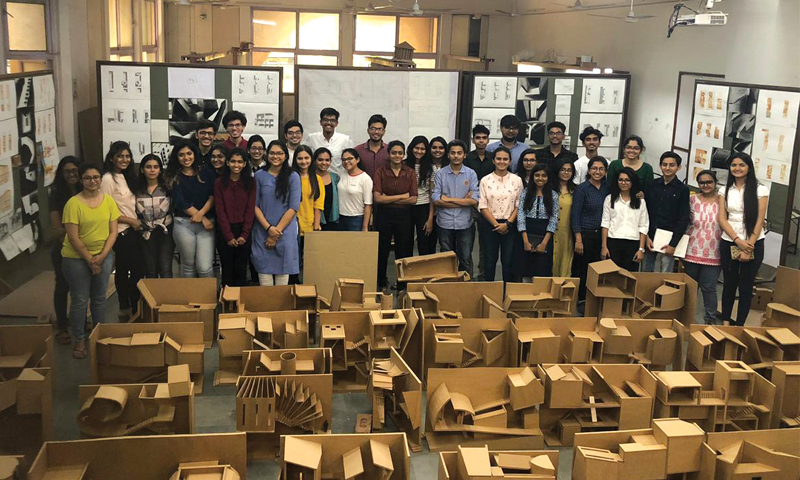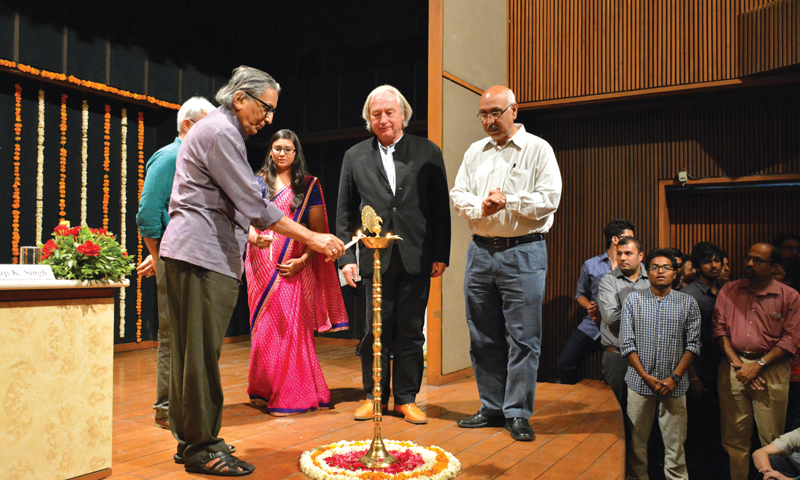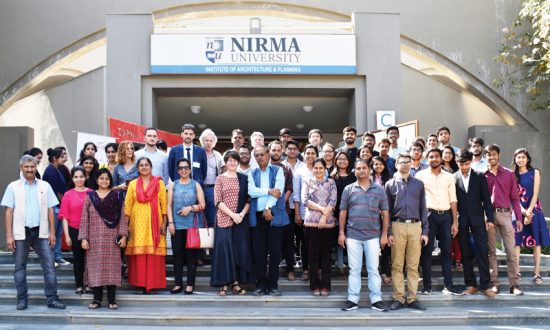The disciplines of Architecture and Planning go beyond the functional aspects of designing buildings and towns to creating vibrant human environments that enhance the quality of life of the people and the overall character and image of a place. It is a field that encompasses various aspects like urban design, energy conservation, sustainability, ecology, landscape, heritage conservation, affordable housing, infrastructure and public transport, and design of public spaces, etc. at both micro and macro scales. Nirma University, Ahmedabad understood the delicate art of creating sustainable living spaces’ and wanted to educate architects who could not only understand but also bring this knowledge to fruition. Thus, in 2014, the Institute of Architecture and Planning, Nirma University was born.
Functioning under the aegis of the Nirma Education and Research Foundation, Nirma University is a statutory university established under a state act. With Karsanbhai K. Patel as the founder chairman of the Nirma Group and the president of Nirma University, Institute of Architecture and Planning, Nirma University (IAPNU) was instituted to enhance and further the quality of architectural education, which in turn would contribute to building India as a foremost country.
A Pedagogy and Mentoring System Sans Pareil
The teaching-learning methodology followed at IAPNU is a unique mix of field-based experience, development of sensorial perception, and learning by doing. Adopting a multidisciplinary approach to curriculum design, the curriculum followed is an integration of creative, technical, skill-based, and humanities fields. For instance, a sun emulator heliodon has been set up as an interactive teaching-learning tool for testing and comparing alternative climate responsive architectural design.

All subjects lead to the design studio, where knowledge of theoretical subjects is applied to create the design of various types of building, areas, and cities relevant to the Indian context. The faculty ensures that design exercises include a range of scale and variety, so as to expose students to diverse ideas. IAPNU follows a mentor system whereby each faculty member is assigned to 20 students and an informal and laid-back atmosphere is ensured around the campus so that students are not pulled back from voicing their opinions and questions to the mentors.
Offering electives and allied subjects, especially like urban design, urban planning, landscape, and design to introduce students to fields for pursuing post-graduate studies, as part of the curriculum, IAPNU encourages diversity in learning. It is also noteworthy that IAPNU promotes experiential learning by facilitating documentation and exploration study programs. Related Study Programme (RSP) is an important component of the program curriculum for B. Arch and B. Plan that is conducted within the country as well as abroad. Additionally, industry and site visits as part of learning are also carried out.
Apart from an exclusive library facility, as well as access to online facilities of Ebsco host and Scopus, IAPNU also houses excellent infrastructure facilities like studios, well-equipped GIS and Fab laboratories, with a digital printer, laser cutter, and 3D cutter, and construction workshops.
Shaping All-round Individuals
Unlike its peers, IAPNU considers its students as active partners in managing the Institute in its activities viz. conferences, training programs, guest lectures, seminars, cultural programs. This culture inculcates the spirit of independence, leadership, and the ability to take decisions after critical evaluations in the students. Moreover, events like “KALP”, the annual technical and cultural festival at IAPNU, is completely planned, organized and managed by the student council, they also get a chance to display their managerial qualities. KALP is an amalgamation of applied learning through relevant co-curricular and extracurricular activities. Installations erected at KALP generates a lot of enthusiasm and a lateral learning atmosphere, while also witnessing several formal public lectures by eminent architects and planner across the country and from outside India along with a range of workshops.

It is also commendable that withing a short span, IAPNU, to foster fruitful relationships across the globe, has signed MOU’s with foreign universities, thus opening doors for student exchange, faculty exchange, and collaborative research and design program. Some of the universities that IAPNU has shaken hands with are Escola Da Cidade, Brazil; ENSA Nantes, France; EAVT, Paris; and Curtin University, Australia.
Headed by the esteemed Prof. Dr. Utpal Sharma, who has been awarded Honorary Doctorate from Ecole Superieure Robert De Sorbon, France, IAPNU recently won the ‘Reubens’ Trophy, at the 62nd Zonal Annual NASA (National Association of Students of Architecture) held at Amity University, Mumbai from 20th-22nd September 2019. “We were awarded ‘Citation’ (Winner) in that category and was judged the best college for academic excellence. It is a matter of great pride that we bagged the first prize in our first attempt at NASA,” says Prof. Dr. Utpal Sharma, Dean & Director, IAPNU.

Dean & Director
IAPNU
Fully geared to help students succeed in their education, career, and engage in civic and cultural life, IAPNU has been actively responding to the educational needs of its local population and economy. Recognizing that learning is a lifelong journey, IAPNU provides opportunities for intellectual enrichment and physical well-being, while serving as an educational leader and contributing its resources to the intellectual, cultural, physical, and economic vitality of the region




